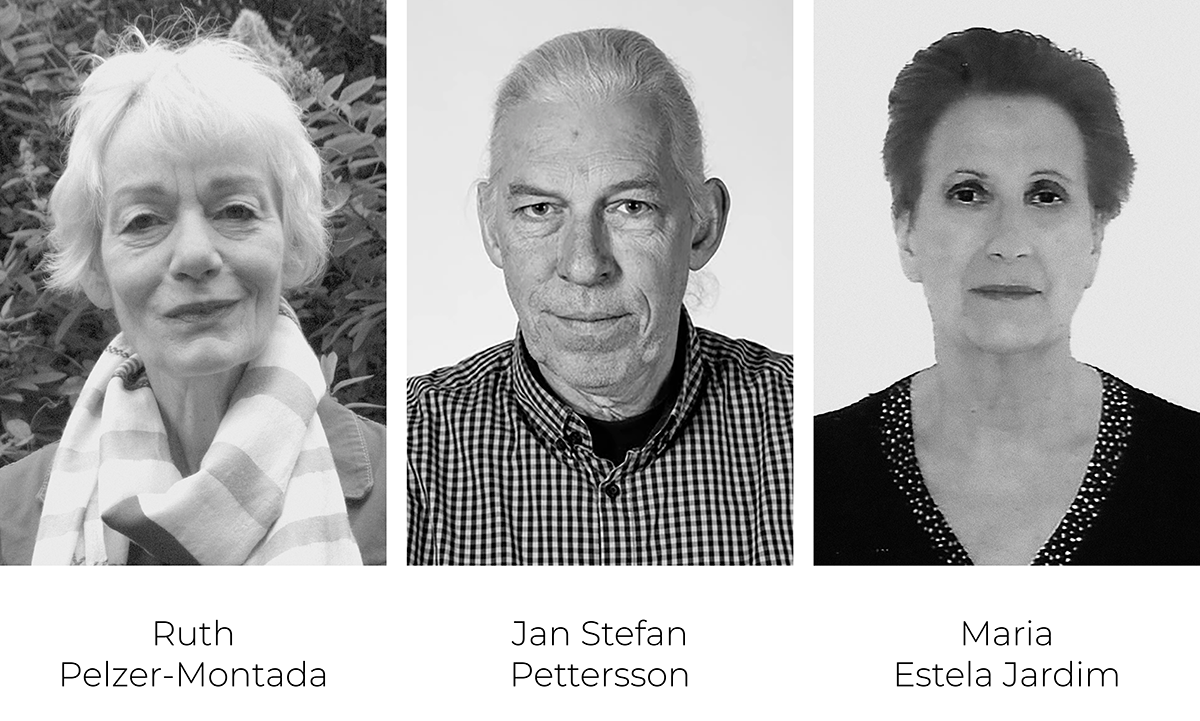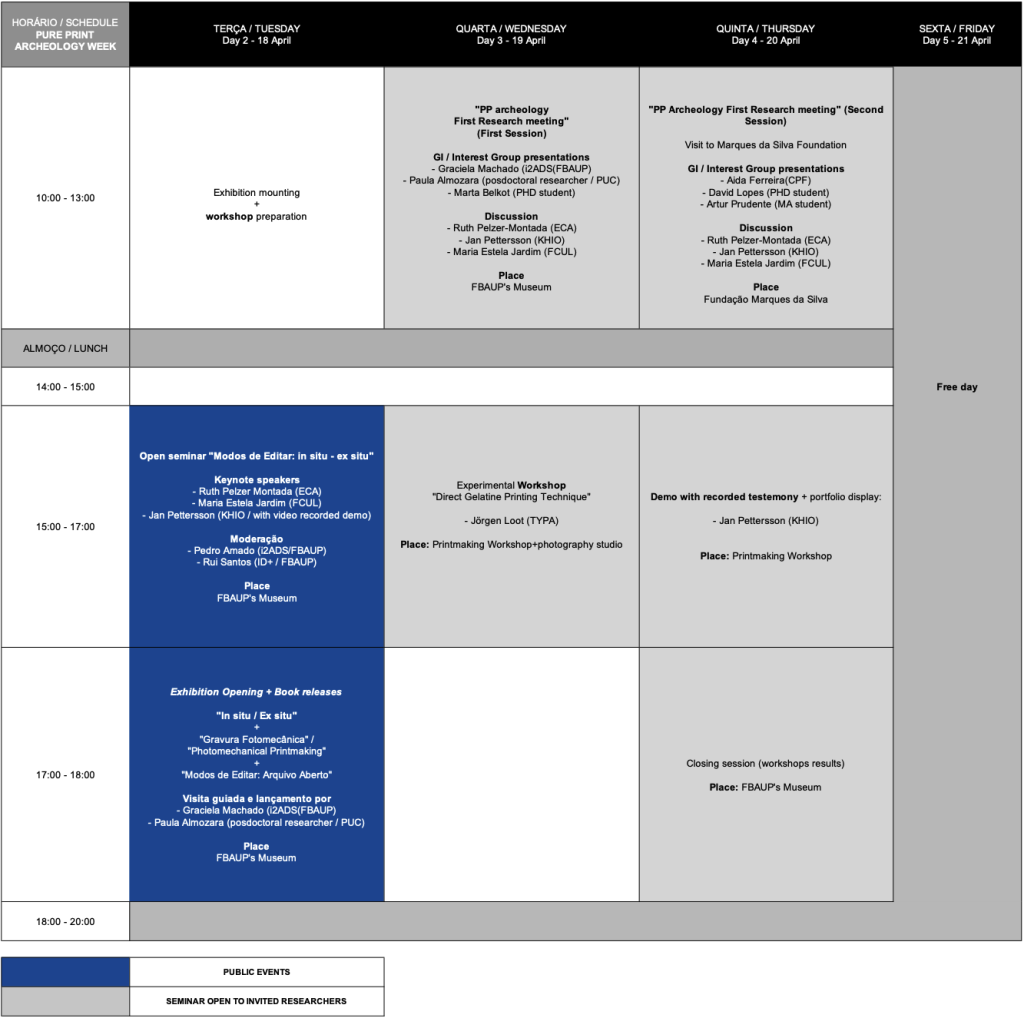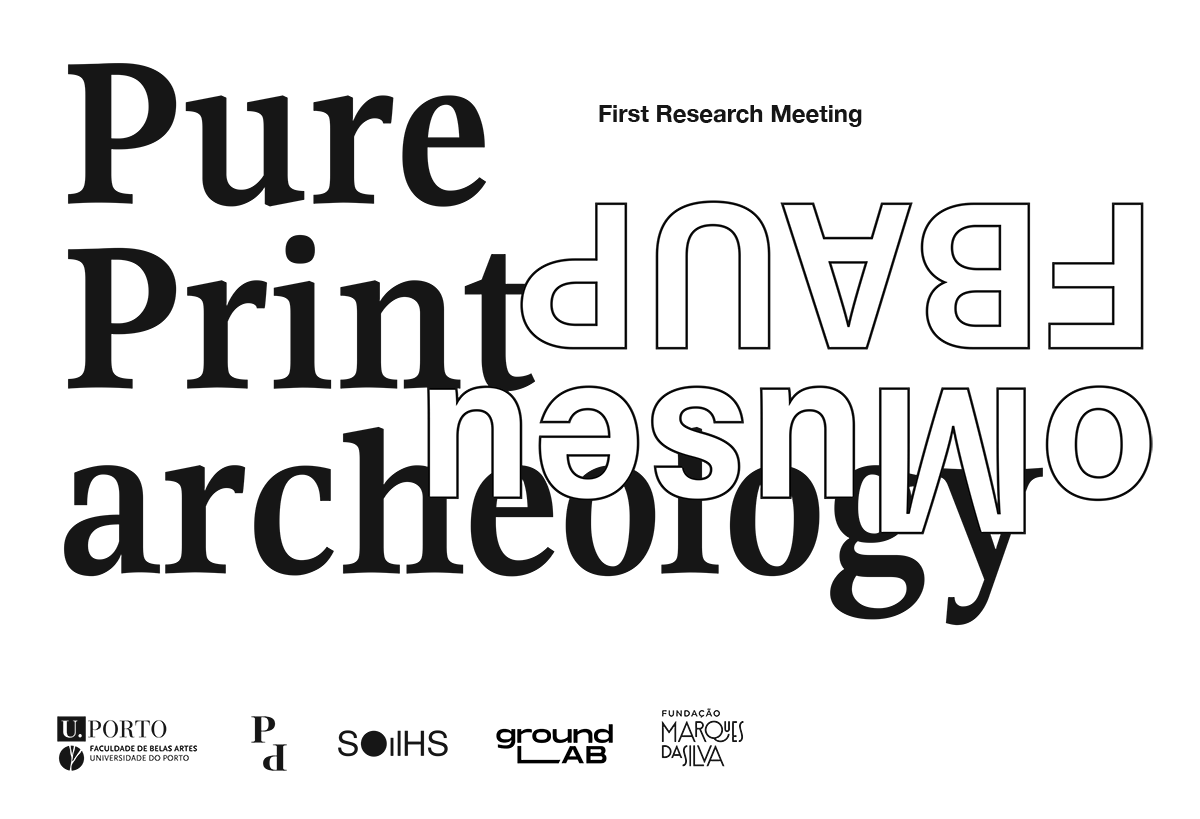Program Description
Pure Print archaeology (PPA) 1st research meeting aims to reflect on photomechanical printmaking practice and its research status. As such, the PPA interest group (i2ADS/FBAUP) proposes a program dedicated to delivering open lectures on contemporary and photomechanical print production, opens one exhibition documenting how in the last few years, local team researchers, together with postgraduate students, have studied and contributed to the understanding of different aspects of production, adaptation, materiality, and artistic significance of photomechanical printmaking; launch two publications.
During this intensive week, invited distinguished specialists will provide open demonstrations focused on contemporary and historic photomechanical print production, showing how they hand print such processes. The restricted access program also allows collecting testimonies from conservators, collections managers, archivists, and printmakers and promotes discussion forums. One hands-on workshop will allow a specialist group to intensify the study of experimental gelatin-based techniques as started during the artist-in-residence program at the summer Typa Printing and Paper Art Center in Estonia. A tour to Fundação Marques da Silva will allow participants to see some examples of historic photo-engravings produced in Porto and discuss how in the future, our interest group methodology, “technological archaeology,” may help to interpret, preserve, treat, and display such under-researched materials.
The meeting is being organized by the i2ADS. We also rely on the collaboration with Erasmus + mobility partners from the KHiO – Oslo National Academy of the Arts, Edinburgh College of Art, and Facultad de Bellas Artes to support the coming and Fundação Marques da Silva to host one of the seminar sessions.
History & Context
This meeting is being organized in the context of previous similar initiatives, such as the Pure Print international printmaking meeting (the 1st, 2nd, 3rd, 4th, and 5th editions). It marks the creation of the local interest group PPA (Pure Print Archaeology), and this year the 6th Modos de Editar integrates the PPA as a transdisciplinary event of reflection on the reproduction and dissemination of the image.
The idea of organizing a one-week research meeting is to hold an event to work with invited specialists from various sub-disciplines or specialties who join us to contribute with their unique perspectives. Several students in this interest group benefit from Master’s and Ph.D. studentships funded by FCT. Their programs are based on “technological archaeology” to study the history and practice of 19th century and 20th Century photomechanical printing processes. Further to this, for over five years, our research not only has led to new insights into the physical history of relatively obscure processes, including photo enamel, gillotage, photo engraving, and reprographic printmaking, as we have been setting up working practices and ways to engage with information and construct knowledge quite unique within artistic research. We also aim to discuss and reflect upon our working practices with archivists, conservators, museum curators and artists. Our mission is to establish connections and discuss technological archaeology to help interpret local collections and promote a different perception of the possibilities of photomechanical printing for fine art, design, craft, and cultural heritage. As a group of interest originated within a fine art and design context, we are sensitive to reflecting on how to link research to diverse publics, including museum professionals, community members, and academics, and to foster interdisciplinary and transdisciplinary discussion. Further, we are willing to take creative approaches in our research that may result in the future collective understanding of printmaking practices, promote a shared practice on under-researched materials, one that will allow for new interpretations and improved approaches to collections, foster interpretation, preservation, treatment, and display of prints and related artifacts. As a group of interest, we aim to organize regular discussions and seminars attended by specialists that wish to meet and discuss such issues with us and are open to establishing collaborations.
Venues
- The open seminar with its lectures and demonstration will be held at the gallery of the Museum of FBAUP, where an improvised print studio will be mounted;
- The exhibition will be held at the gallery of the Museum of FBAUP (on the third floor of the main building), where the two books will be launched;
- The first meeting session will be held at the gallery of the Museum of FBAUP;
- The specialist workshop will take place at the Photography lab.
- The testimonies will be collected at the Printmaking workshop (video), and portfolios will be displayed at the same location.
- The tour and the second session seminar will take place at Fundação Marques da Silva.
We will publish the comprehensive technical data produced for the exhibition as a meeting proceedings’ book, with an ISBN register number, and organize it to make part of previously collected printmaking knowledge.
Program
During the research meeting, we will hold several activities:
- 6th Modos de Editar: “in situ – ex situ” open seminar with international keynote speakers;
- Books releases;
- Local research team discussions on traditional contemporary and historical printmaking techniques with invited specialists.
- Oral communications on research and practice from PPA Interest Group members;
- Curated exhibition;
- Portfolio display of Printmaker’s works;
- Collecting printmaking testimonies (videorecording);
- Demonstrations and specialists’ experimental workshop;
- Collect extended technical data produced for the exhibition and during the seminar to have a meeting proceedings book.
Key speakers

Weekly program

Pure Print archaeology Meeting Planning Committee
Graciela Machado (i2ADS / FBAUP)
Rui Vitorino Santos (ID+ / FBAUP)
Pedro Amado (i2ADS / FBAUP)
Organizing Committee
Graciela Machado (i2ADS / FBAUP)
Rui Vitorino Santos (ID+ / FBAUP)
Cristina Ferreira (FBAUP / i2ADS)
Rui Ferro (FBAUP / i2ADS)
Catarina Marques da Cruz (FBAUP / i2ADS)
Paula Almozara (PUC-Campinas, Brazil)
Marta Belkot (FCT / i2ADS)
David Lopes (FCT / i2ADS)
Artur Prudente (FBAUP / MAP)
António Silva (FCT / i2ADS)
Guest Researchers
Ruth Pelzer-Montada
Jan Pettersson
Jorgen Loot
Maria Estela Jardim
Aida Ferreira
Observadores/observers
Flor Ceres Rabaçal
Secretariat
Margarida Dias (FBAUP / i2ADS)
Media
Adélia Santos Costa (DAP/i2ADS/FCT)
João Lima (FBAUP)
Exhibition
Graciela Machado (FBAUP / i2ADS)
Paula Almozara (PUC-Campinas, Brazil)
Luís Nunes (FBAUP / i2ADS)


